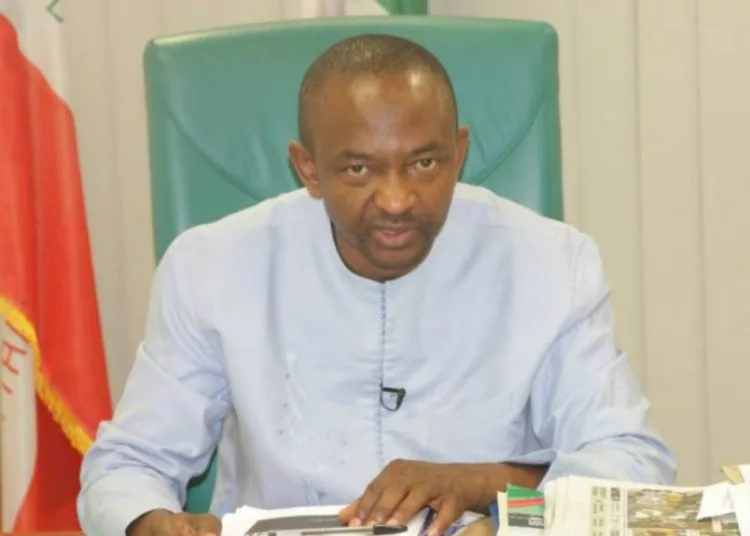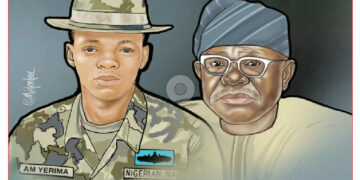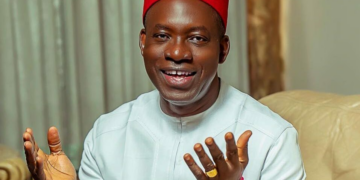Even though a state owned tabloid, the Nigeria Standard newspapers was a ranking national newspaper in the true sense of the word. Its circulation covered almost all parts of the country. Its media structure was superb and one of thebest. The founding fathers of this newspaper were truly professionals who knew where they were going from where they started. Its no wonder, that regardless of its premature birth, it survived and grew to national prominence. It was a strong pillar of journalism that birthed and raised many top and famous practitioners in Nigeria. It was one of the famousnational newspapers whose origin and foundation was historic, dramatic and quite interesting. It is always a story to behold. Many top media gurus I met in the course of my journalism profession confidently told me they all started at the Nigeria Standard. Space will not allow for the mentioning of names.
In those days only the New Nigeria Newspapers, founded by the late Sardaunan Sokoto were on the streets in the north which covers Benue-Plateau. Something happened that changed the course of history. The story was told that it was during one of the official visits of the then Military Governor of old Bendel State, General Samuel Ogbemudia to his friend, Commissioner of Police, CP Joseph Gomwalk in Jos in 1972,that the Nigeria Standard was miraculously conceived and delivered. Because the visit was given poor media coverageby the New Nigeria Newspapers in Kaduna, a media conscious and enlightened Gomwalk was very disappointed and angry. The patriotic rage led to his getting in touch with his colleague, Ogbemudia whose state already had the Observer Newspapers and got the inspiration to start the Standard Newspapers. He immediately gave directives that the Standard Newspapers be started to fill in the gap. Media practitioners were quickly assembled with some redeployed from the various MDAs to start work.
The paper immediately swung into publications and was competing very favorably with the NNN covering the north East which was the largest political zone then, comprising of Bauchi, Gombe, present Yobe, Taraba, Borno and the north west comprising of Sokoto, Kebbi, Zamfara, Niger states and other parts of the country. The southern part of Taraba,especially the Jukun speaking area was part of Benue-Plateaustate then. One third of Abuja was also part of Benue-Plateau. According to history, the first publication of the Nigeria Standard debuted on 8th July,1972( first edition). It started as a monthly newspaper and was being printed all the way from Benin, at the Observer printing press courtesy of Ogbemudia. From there it became a weekly and then daily in 1974. The paper commenced with Mr Iliya Audu as the pioneer acting editor who was seconded from the civil service until a substantive editor, Gideon Barde was appointed following a rigorous panel interview which screened 7 other candidates.
Writing about my experience with the Nigerian Standard Newspapers which is also the foundation of my journalismcareer is a thing of great joy for me. I had initially rejectedworking with the newspaper because of poor salary, but the instinct to join and learn the work and develop my skills would not allow me discard the idea. I have seen hard work that produces quality results at the organization and therefore would not resist it for long, especially also that getting a job elsewhere was not easy after the NYSC. I did a lot of interviews at many lucrative organizations without success and as providence would have it, I ended up picking my first appointment with the same newspaper, even though not initially on a permanent basis.
My contact with the Newspaper started way back when my father retired from the army after the end of the civil war on health grounds and relocated us from the Giginya Barracks in Sokoto where I was born straight to the village. We were in Limpye village of Ampang East district of Kanke LGA where I enrolled in the LEA primary school in 1979 having just finished my nursery school at the Model primary school Sokoto. My father took to photography as his post retirement occupation after leaving the army. He had left the primary school in class four to join the army and after the retirement, he came back to complete primary five and six. The coincidence of that with my new primary enrolment saw me and my father attending the same primary school. While he joined in class five, I was in class 1 and by the time he was in his last class 6, I was in primary 2. The location of his photography was Barkin Ladi where he comes home at weekends with copies of the old model pictures for us to see. One day he brought my maternal uncle, my mother’s senior brother, the late Mr Iliya Limpye Lar, also a retired military police whose post retirement career was printing. He was employed at the printing section of the Nigerian Standard Newspaper where he brought home free copies of the standard newspaper everyday and each time I came to Jos for holidays, I would go through virtually all the old copies. I kept myself busy with reading the old tabloids and in the process, developed deep interest in journalism.
Sometimes I would come to Jos for holidays just to read the Standard Newspapersand would always find every copy available for me to go through. His wife who sells akara dared not pick any of the papers to wrap her delicious KOSAI for her customers because I would be coming to read them. It was those I disposed that she eventually gets to wrap her akara. This continued for years and each time I was in Jos, he would take me to the Standard house to stay with him throughout the day and we close together. All the canteen staff knew me very well cos we visit them daily and I could even eat on creditbecause of familiarity. I was seen by many as a young PPC staff learning how to print newspapers or the popular cactus exercise books then.
I became so close to the Publishing house and had unfettered access to the company. Most of the printing staff, circulation officers and drivers knew me even before I eventually became a staff in 2001. That was the beginning of my sojourn in journalism as my reading consciousness blossomed and soon afterwards, I started developing interest in writing. When I finished primary school in 1985 and went to Gonerit memorial College Tuwan- Kabwir, my journalistic instincts grew. My membership of the Press Club encouraged me greatly. I started writing letters to the Editor to the Standard Newspapers and because my uncle worked there, it was very easy to get all my letters published which I always displayed them with pride. Even my teachers and the school Principal would always asked how I did that and I would always brag of my connection with the newspapers. Sometimes I collect letters to the editor from my peers at the press club and publish them. That improved my profile before the teachers and my fellow students who saw me as a senior man among them. From there I started extending my letters to Punch and other newspapers who would publish them. Of course I used my uncle who would get my letters to the Standard editors always. It continued even during my tertiary education at the University of Jos. After my graduation in 1996 and my NYSC in 1999, I stayed without a job for years and finally became a beneficiary of the Poverty Alleviation program of the federal government on a monthly stipend of 10,000. One has to get enrolled through an agency of government as a condition and yours sincerely did not waste time in seeking for refuge with the Nigeria Standard Newspapers which I had become part of. The then Editor, Mr Emmanuel Gogwim did not waste time in approving my request and recommended me as a reporter to work at theAbuja bureau of the company where Mr Aristarkus Yohana was bureau chief. I enjoyed my work under Ariskarkus alongside the late Suleiman Bisalla, late Rakiya Zakari, Jidauna Yanung before Nanfe Audu joined us around 2002/2003.
Even though a state newspaper alongside Benin’s Observer, Kwara’s Herald, and other state owned newspapers, I was always full of joy doing my beats. I enjoyed writing and my works published.
As a new entrant into the profession then, I did not take anything for granted. I was never discouraged because it was a state or local newspaper. We suffered a lot of stigmatization and marginalization from our colleagues who worked with the so-called national newspapers like the Punch, Vanguard, Thisday, Guardian,Tribune, etc, most of whom don’t even publish their stories . At assignments, we were not treated equally. Adverts were selectively placed and even trips with top government officials were selective on account of the national spread of your medium. Because of the limited scope and circulation of the paper, we were not involved in major trips with ministers and other top government functionaries.. Even the brown envelop popularly known as ‘kwa’ were denied us most of the time except where the MDA media managers decide to show mercy. In spite of this frustration,inequality and ill-treatment from colleagues , I did not give up. I kept my patriotism alive by working and sending my work to the editors. My utmost joy and fulfilment was that my storied were always published, and most times as headline stories. Once my stories were published, I would buy the papers myself and take them round to the MDAs. Because I sustained that through the years, I became friendly and deeply familiar with most media managers of my beats who started giving me adverts and inviting me for trips with Ministers and other top government officials. Civil society organizations who did not differentiate between the various mediums also took serious interest in all that I was doing. One thing I have learned over the years is diligence and hard work. It is the value you place over what you do that determines the results you get. I never attended any journalism study in my life, neither did I undertake course close to journalism or mass communication, even though I participated in series of national and international on-the-job trainings ,seminars, workshops and retreats that build my capacity and knowledge. It was my interest in the profession that made me a journalist by profession, even though a political scientist by training.
The Nigerian Standard newspapers have paid its dues. Even though a medium with limited scope, its impact went far and beyond its physical boundaries. Today, the story of the paperis that of mixed feelings for me. While the paper sailed throughout the nation and impacted tremendously in its early days, it dwindled under successive regimes due to lack of interest,funding and absence of attached value and political will. Even though most state owned newspapers suffers the same fate almost everywhere, it could have been different in the Nigeria Standard because to me, it was not at the same level with other state owned tabloid. If a newspaper can emerge under the military and waxed strong, it is expected that its reach could have gone farther under a democratic rule.The seeming absence of a sound media culture by successive democratic regimes in the state especially between 1992 to date, is majorly responsible for its situation. Perhaps its because non of the elected governors during these periods,was a journalist.
I worked with the newspaper for about 4 years and enjoyed my work, but not without my pains and agonies. Together with 9 other colleagues we stayed without salaries for 3 years between 2001 and 2004 after our formal engagement. Unknown to us, our employment was ridiculously swapped and while we thought we were staff, the records showed differently. Our pains and frustrations took us to the Public Complains Commission and all offices of the security agencies in the state including the labour offices to register our grievances. It was during the state of emergency that General Chris Ali graciously reinstated us back to work to the shock of many after hearing our story. Our reinstatement was miraculous, because it defied all known service protocols. Even the staff union gave up on our case. Instead of showing us compassion and helping us, the union teamed up with the management to deepen our pains and frustrations. But God intervened and what we passed through shaped us into better practitioners in the various places we subsequently found ourselves. It became a strong guide and life template for us in our subsequent endeavors and each time we tell the story, we laugh over it. I appreciate the founding fathers, especially the late JD Gomwalk of blessed memory and all pioneer staff of this great and historic organization, those who served as editors, managers, news editors,sub-editors, etc, for their efforts sacrifices. The experiences at the Plateau Publishing Company, PPC truly prepared me for life’s work and my subsequent sojourn into politics. I look back with deep reflection and gaze through with excitement all we have done and passed through. Its not yet over until it is over. One day one among us (the former staff) will be the governor of the state and that will be a new good beginning of another phase for the company.





